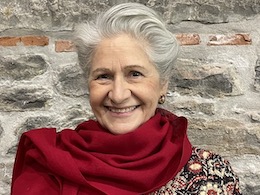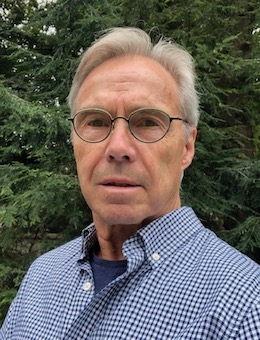
The Rope of Sexuality Or How children’s ‘researches’ prime the place of sexuality – A Laplanchian view
Presenter: Cecilia Taiana, PhD
Discussant: Stephen G. Fowler, MD, FIPA
Saturday, May 25, 2024: 10:00 am to 12:00 pm
Cost: $100
Open to all by registration.
** DISTANCE PARTICIPATION ONLY – This event will be conducted online.
Preregistration is required.
Registration deadline: April 25, 2024
This presentation returns to Freud’s papers on infantile theories of sexuality. On the Sexual Theories of Children, Freud (1908) reminds us that we should pay attention to the infantile theories of children because they are still “operative in adulthood” and they acquire a “determining influence upon the form taken by the symptoms” (p. 211). Spirited by this remark, this talk embarks on a close examination of Freud’s papers dedicated to children’s investigations and infantile theories and the elaboration of leaning-on proposed by Laplanche in the hope of showing how children’s chance and not chance experiences braid the rope of their singularity.
Children encounter two different puzzles. Where do children come from? And the gender differences. Freud oscillates between giving primacy to one over the other. Still, according to Freud, both predicaments are experienced by children as part of the “exigency of life” (ft. p.213), meaning a critical or crucial time or state of affairs that demands action on their part, i.e., explanation.
In 1908, Freud wrote that the number one puzzle is not gender difference. “For the child, the prime puzzle, the one that triggers the earliest childhood sexual theories, is not the male-female distinction but rather the question: “Where do babies come from?” The mother’s bearing (or even expecting) a child most usually serves as the point of departure for such childhood investigations. The genders at the start are a given for the child, but the arrival of another child is always somehow an event that seems to spring from nowhere, from nothing.” The child struggles for knowledge because parents often deny adequate theory and representation, and the child seeks to acquire them. The desire for knowledge is not spontaneous but initiated by what is hidden from appearances. The first split, Freud tells us, occurs here.
Using a case illustration, this presentation intends to expand the clinical basis of Laplanche’s theory of the excitatory and enigmatic message of the adult-other.
Learning Objectives:
- What is the purpose of the session/course in terms of the educational needs of your learners?
My presentation increases knowledge and awareness of the infantile roots of sexuality and proposes ways of bringing this awareness to the clinical manifestations of our patients. - How will this session change the professional/clinical competence of learners who attend?
Participants will be able to recognize and analyze the intersubjective unconscious nature (intersubjectal) of children’s ‘researches’ and their constitutive role in their sexual theories. - How will your session improve learners’ clinical, interpersonal, and communications skills or improve the quality-of-care patients receive?
This presentation is planned to increase participants’ clinical and theoretical competence in understanding and communicating the potential value of entering the session with an attitude of free-floating attention as a fundamental psychoanalytical method and adopting free association as the fundamental rule of the analytic session to allow the primary process to emerge in displacements and condensations.
 Cecilia Taiana
Cecilia Taiana
Cecilia Taiana, PhD, is a psychoanalyst in Ottawa, Canada. Her most recent articles, part of a trilogy, are on What does poetry offer psychoanalysis? Robert Frost’s Sound Sense, CJP, Spring 2022, and T.S. Eliot’s Concept of Tradition, CJP, Fall 2022. The third article is on Wallace Stevens, Connoisseur of Chaos, and His Notion of Motion, CJP, will be submitted in April 2023.
The journal fort da has published two of Cecilia’s poems, A Tale of Sounds, Fall 2022 and Émilie du Châtelet, Spring 2023. A third poem, Our Abiding Companion, was submitted to fort da in April 2023. Last year, Cecilia’s article, “‘Day’s Residues;’ One Vertex among Multiple Vertices,” was published by JAPA in August 2022. She also has a forthcoming article in the IJP, A Machine of the Same: Repetition in the Foundational Discourse of the Argentinean “Being” (1976–1983). For two of her previous articles, she received the Dr. Douglas Levin Prize (2014) and the Dr. Miguel Prados Prize (2017), awarded by the Canadian Psychoanalytic Society.
 Stephen Fowler
Stephen Fowler
After careers as a Family Physician and Emergency Physician, Dr. Stephen Fowler graduated from TPS’s ATPPP in 2003, and the Toronto Psychoanalytic Institute in 2010. He is the author of the book Probing the Mind to Free the Soul: Toward a Psychoanalytic Protest Theology, published in 2017. He has been reading the English translations of Laplanche’s writings since 2014. His private psychoanalytic practice is in Mississauga.
This event is eligible for Section 1 CME credits (0.5 credits/hour). This event is an accredited group learning activity (section 1) as defined by the Maintenance of Certificate Program of the Royal College of Physicians and Surgeons of Canada, approved by the Canadian Psychiatric Association (CPA). The specific opinions and content of this event are not necessarily those of the CPA, and are the responsibility of the organizer(s) alone. As per the Royal College standard, each presentation provides a minimum of 25% interactive learning.
Refunds must be requested in writing two weeks prior to the beginning of the event, after which fees cannot be returned. A handling fee of $30 will be retained.
For more information about and for registration in the tps&i Extension Programs, Scientific Meetings, Training Programs, Study and Supervision groups and Special Presentations, please visit our website: torontopsychoanalysis.com or email info@torontopsychoanalysis.com
